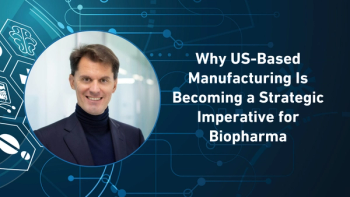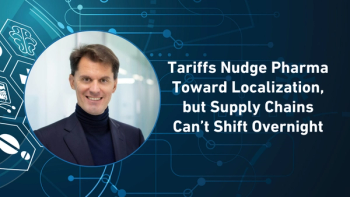
Bridging the GenAI Adoption Gap in Supply Chain
In the first part of his Pharma Commerce video interview, Scott Tillman, Logility’s senior vice president of innovation, describes the disparity in organizations utilizing supply-chain specific applications.
In a video interview with Pharma Commerce, Scott Tillman, Logility’s senior vice president of innovation, addresses the gap between high interest in generative AI (GenAI) and its relatively low adoption in supply chain-specific applications, as highlighted in Logility’s Supply Chain Horizons 2025 Market Report. He identified several key reasons for this disconnect.
First, many companies experience “paralysis by analysis” due to the rapidly evolving technology landscape. With so many options and an unclear starting point, organizations often hesitate to act. Tillman emphasized the importance of adopting an agile, iterative approach—developing, deploying, learning, and refining continuously—rather than seeking a perfect solution from the outset.
Second, he pointed out a cultural shift that needs to happen within organizations. Companies must become more comfortable with experimentation in software implementation, viewing it as a learning process rather than a one-time deployment. This mindset change is essential for successfully leveraging emerging technologies like GenAI.
Financial and technical barriers also play a role. Expertise in GenAI is both scarce and costly, and training models can be time-consuming. Organizations face a strategic decision: whether to build their own AI models or depend on third-party software vendors. Tillman noted that this debate is still in its early stages, and its outcome will shape how companies integrate GenAI into their operations.
Finally, he stressed that in the supply chain space, companies will increasingly depend on vendors like Logility to provide specialized expertise and value-driven use cases. These could include demand sensing, forecasting insights, and other prescriptive applications of GenAI tailored to business needs. Overall, Tillman advocated for a practical, phased approach to GenAI adoption, focusing on clear, impactful use cases rather than waiting for the perfect solution.
He also comments on some common misconceptions supply chain leaders might have about what it means to be “digitally optimized;” the role of automation and GenAI evolving in workforce development; how geopolitical or economic volatility can potentially reshape the way organizations prioritize supply chain investments; and much more.
A transcript of his conversation with PC can be found below.
PC: Despite high adoption interest in GenAI, Logility’s Supply Chain Horizons 2025 Market Report notes that only a third of organizations use supply chain-specific applications. What do you think is driving that gap?
Tillman: There are a couple of things. One is that I think companies don't know where to start. The landscape and technology are changing so fast that there's a paralysis by analysis thought loop that companies are stuck in. The key part is not where you end up, but where you start. Companies aren't comfortable working in this agile mindset where they develop, deploy, learn, modify, and repeat the cycle over and over.
I think there's this mindset that needs to change inside companies regarding software in which they're willing to be more experimentative than what they have been in the past, because there is an element of learning from the implementation that they're going to apply to the next phase of the implementation. This is definitely something that is more a journey and not a destination.
There're also the financial considerations. Expertise is difficult. Expertise is expensive. Training models can take be difficult and take time, so there's this battle going on in the market, whether or not you want to build your own models internally, or whether you want to rely on software vendors to potentially supply models. I think that battle is going to play out over time. I think it's very much in its infancy, and we'll see how companies adopt the software aspect of it.
From a supply chain perspective, companies are going to rely on their supply chain vendors to really supply that expertise, and that's where Logility/AP Gene is looking to provide that expertise in focusing on specific business cases that can provide value—whether it be regarding drop demands, whether it be insights into your forecast. Be prescriptive in how GenAI is going to provide that information to our clients.
Newsletter
Stay ahead in the life sciences industry with Pharmaceutical Commerce, the latest news, trends, and strategies in drug distribution, commercialization, and market access.




